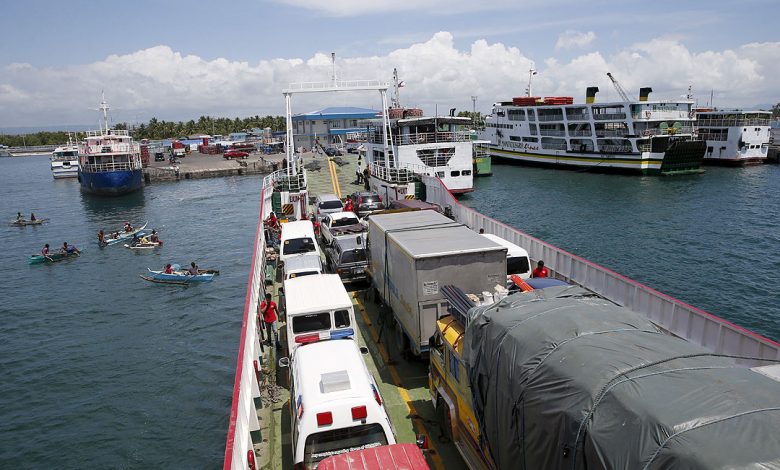Domestic shipping firms worry over proposed law allowing full foreign entry

Cargo and other vehicles are pictured inside the inter-island roll-on roll-off ferry as it leaves a port in Lucena City in this file photo dated March 10, 2016. — REUTERS/ERIK DE CASTRO
By Arjay L. Balinbin, Senior Reporter
LISTED shipping companies are expected to benefit from the law allowing full foreign ownership of public services, but some domestic shipping firms worry about the potential negative impact on their business.
“I just hope that our lawmakers will reconsider this [bill], and that they help the domestic industry first,” Philippine Inter-island Shipping Association (PISA) President Christopher S. Pastrana told BusinessWorld in a recent phone interview, referring to Senate Bill 2094, which seeks to amend the 85-year-old Commonwealth Act 146 or Public Service Act.
Voting 19-3-0, senators earlier this month approved a measure that effectively allowed full foreign ownership in public services such as domestic shipping, telecommunications, air carriers, railways, and subways, which are also classified as “critical infrastructures.” The Constitution previously limited foreign ownership in these sectors.
However, the proposed measure also stated that an entity controlled by or acting on behalf of a foreign government or foreign state-owned enterprises are prohibited from owning capital in any public service classified as critical infrastructure.
It also has a “reciprocity clause” that prohibits foreign nationals from owning more than 40% of capital in public services engaged in the operation and management of critical infrastructure unless their countries accord reciprocity to Philippine nationals.
“There is still hope because this bill categorizes domestic shipping as a critical infrastructure, but let us help Filipinos first,” Mr. Pastrana noted.
“This measure could really affect the investments of the domestic shipping industry. The foreign shipping companies already enjoy certain benefits that we don’t have as domestic shipping companies.”
The Export Development Council said in a statement that the proposed legislation “will redound to facilitate greater competition and investment in the transportation sector for better services and lower costs, to support the flow of goods and services, for the growth of national exports.”
According to Mr. Pastrana, the main argument of those who are pushing for the passage of the bill is the high shipping costs, which they claim will go down once there is more competition.
However, he said the government and the private sector should instead focus on addressing existing issues that contribute to such high costs rather than allowing full foreign entry.
“They perceive that by opening and liberalizing the industry, it will create competition and reduce the transport costs, but we’ve been saying that shipping is just 30% to 35% of the entire transportation costs, and you still have the ports, you have all these roads, you have all these infrastructure that is needed, you have containers going south but empty going north. I mean, there are so many things that have to be done,” he said.
The PISA official said that compared with foreign ships, domestic shipping companies “don’t get any subsidy while foreign companies “use tax-free fuel from overseas.”
“We only have good equipment at major ports like Manila or Cebu, so loading and unloading is different compared with those highly developed ports. How do we solve these? Even the roads — Manila to Davao is only 1,200 kilometers, but it takes almost 40 hours for a truck to get to Davao,” Mr. Pastrana noted.
Sought for comment, Chelsea Logistics and Infrastructure Holdings Corp. President and Chief Executive Officer Chryss Alfonsus V. Damuy said in a phone message: “In the domestic shipping, allowing 100% ownership gives leeway for local players to have foreign investors not worrying about percentage ownership.”
He noted that domestic shipping companies, by allowing full foreign entry, can adopt global best practices.
“This may also boost the modernization the government is advocating. Shares of listed companies will also be openly traded to foreign buyers or investors, which may result in higher trade volume or liquidity,” Mr. Damuy added.
Rizal Commercial Banking Corp. Chief Economist Michael L. Ricafort concurred, noting that foreign investments in the local shipping industry would lead to new and expanded capacity in terms of more ships servicing additional routes across the archipelago.
This could also “facilitate more technology transfer, increase efficiency, and help lower shipping rates or prices,” he noted.
“Consistently, more foreign portfolio investments would also flow into the listed shipping companies. Thus, a bigger set/roster of investments from overseas would also effectively lower the cost of capital for FDIs (foreign direct investments)/portfolio investments into the local shipping industry,” he added.
Patrick Ronas, president of the Association of International Shipping Lines, said, international carriers will have an advantage as the tonnage deployed will be much larger than the domestic players.
“But the challenge will be on the terminals, whether they have the capacity for the added volumes should carriers accept domestic cargo. A lot of major ports differentiate themselves, whether they cater to international or domestic cargo. Not both. Because of this, the tariff will be different,” he said in an e-mailed reply to questions.
Sonny A. Africa, executive director at think tank IBON Foundation, told BusinessWorld that the national security implications should not be overshadowed by the possible entry of more foreign investments.
He said there are also inherent limitations to foreign investors who decide according to their global conditions and options.
“For instance, they can decide to leave if for whatever reason it is no longer profitable for them to stay like Intel and Hanjin did. These foreign firms left without leaving any domestic capacity behind,” he added.
Mr. Africa also noted that profit-seeking foreign shipping firms will have undue leverage over the government because of the threat of exiting and disrupting shipping services.
“At worst, they may leave if it’s no longer profitable for them and leave the country in a lurch. Also, foreign firms are more likely to prefer their existing foreign suppliers of ships and maintenance services. This will have the effect of stifling the development of domestic capacity in these areas beyond marginal segments.”

![Photo of [B-SIDE Podcast] PHL’s battle against fake news on West Philippine Sea](https://redstateinvestings.com/wp-content/uploads/2023/08/2023-08-22-B-side-KyleGill-ART-300x300-58td91-300x220.jpeg)


